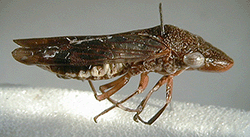Subfamily Cicadellinae: Tribe Proconiini
This tribe is not recorded in Australia but is included here to assist in the early detection of any future incursion. Any specimen that keys out here needs to be sent to a specialist taxonomist to check the identity since the glassy-winged sharpshooter, a member of this tribe, has not yet been found in Australia.

The Glassy-winged Sharpshooter
Homalodisca vitripennis (Germar)
There are no known species of Tribe Proconiini in the region, but this tribe is included because of the importance of The Glassy-winged Sharpshooter Homalodisca vitripennis (Germar) [formerly H. coagulata (Say), see Takiya, et al. (2006)].
The glassy-winged sharpshooter (GWSS) is the most effective and damaging vector of Pierce's Disease of grapevines in California but it feeds on a wide variety of plant hosts. Pierce's Disease is caused by a bacterium, Xylella fastidiosa, which also has a wide host range, including peach, citrus, plum, almonds, avocado, olive and oleander. GWSS is native to NE Mexico and the south eastern states of the USA but spread to California in 1990, possibly as a result of the reduction in use of broad-spectrum insecticides in Californian vineyards. It was subsequently detected in French Polynesia (1999), Tahiti (2001), Hawaii (2004), the Cook Islands (2007) and Easter Island (2010). A further concern about GWSS has been demonstrated by Suttle and Hoddle (2006) who provide evidence that spiders feeding on GWSS in the islands of French Polynesia are being killed by an unknown toxin contained within the insects. GWSS therefore may pose a threat to island ecosystems by altering the population dynamics of this important group of predators. Further detailed information on the life history, impact, and control ofHomalodisca vitripennis is available at https://www.cabi.org/isc/datasheet/27561.
In general appearance, GWSS is superficially similar to a number of Australian species, particularly in the tribe Thymbrini, but can be easily differentiated from them by the grossly swollen frons, an indication that it feeds on xylem fluid rather than on phloem fluid. The tegmina are also transparent between the veins and are narrow, not covering the whole dorsal and lateral surfaces of the abdomen (a feature of the Proconiini) while in Thymbrini the tegmina are opaque or semi-opaque and completely cover the abdomen.
Other Australian Cicadellinae are quite different in colour and shape from GWSS, in particular lacking the broadly triangular flat vertex. In Australian Cicadellinae, which all belong in the tribe Cicadellini, the vertex is much shorter and rounded anteriorly, highlighting the swollen frons.
